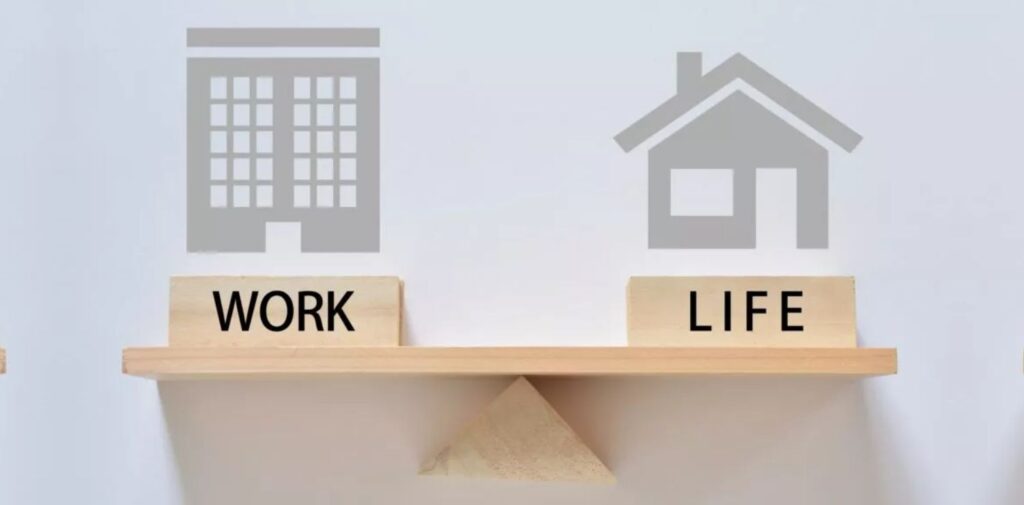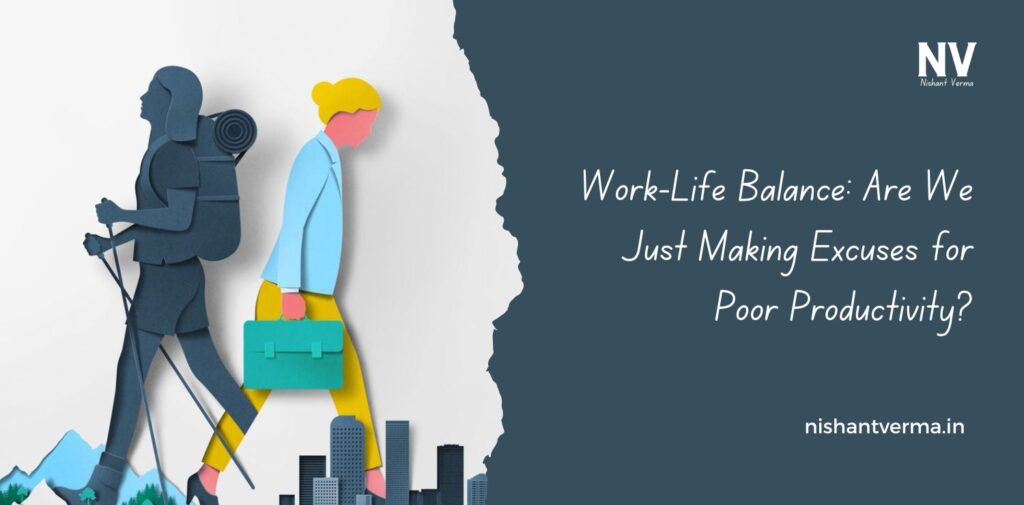In today’s fast-paced world, the idea of work-life balance has gained significant attention. With the rise of technology and global connectivity, many people are finding it harder to separate work from their personal lives. As a result, terms like “work-life balance”, “burnout”, and “mental health” are frequently discussed in both corporate and personal circles.
But here’s a question that’s often asked: Are we using the idea of work-life balance as an excuse for poor productivity? In other words, is it possible that some people use the need for balance as a way to avoid hard work or tackle challenging tasks?
Let’s explore this idea and understand whether work-life balance is a true necessity or just an excuse for not performing at our best.
What is Work-Life Balance?
Before we dive deeper into the topic, let’s first understand what work-life balance means.
In simple terms, work-life balance refers to the ability to manage both work-related responsibilities and personal life activities (like family time, hobbies, social life, and rest) without one taking over the other. For example, someone who works 9 hours a day and still has enough time to spend with their family, relax, or pursue hobbies is said to have a good work-life balance.
For many, the idea of balance is about maintaining mental and physical well-being, reducing stress, and preventing burnout. However, this balance can look different for everyone. What feels like a balanced day for one person may feel like too little or too much for someone else.

Rise of Work-Life Balance
In recent years, the push for work-life balance has been gaining momentum, especially in corporate environments. With increasing work pressure, long hours, and constant connectivity (thanks to smartphones and emails), people are finding it difficult to switch off from work.
According to several surveys, many employees, especially in high-pressure jobs, report feeling overworked and stressed out. This leads to high rates of burnout and dissatisfaction in the workplace. In response to these challenges, companies are now adopting work-life balance policies, offering flexible hours, remote work options, and mental health support.
For many, these measures are a lifesaver. People feel more empowered to control their schedules and manage their time more effectively. When employees can rest and recharge, they often return to work more productive, motivated and engaged.
But there’s a flip side. Some people argue that the term “work-life balance” is sometimes used as a cover for poor work habits or lack of focus. Let’s explore this perspective.
Argument: Is Work-Life Balance Just an Excuse?
There is a growing belief that the push for work-life balance is sometimes used as an excuse for avoiding hard work or failing to meet expectations. The argument goes something like this:
- People claim that they need more “balance” to handle the stress, but they might be making excuses for not giving their full effort at work.
- Many people, especially younger workers, say that they need more “me-time” or “breaks” to recharge, but the reality is that some of them are simply not as focused or disciplined as they should be during working hours.
- The rise of “side hustles” or “passive income” also brings a new challenge. People may be more focused on creating their brands or running side businesses, leading them to cut back on their professional responsibilities.
For example, in India, it’s common for young professionals, especially in urban areas, to juggle multiple jobs or freelance work alongside their full-time roles. This leads to longer working hours but sometimes leaves them feeling unproductive or overwhelmed. The demand for work-life balance in such cases often stems from a lack of time management rather than a genuine need to rest.
The problem here is that balance becomes an excuse for not focusing on tasks or delivering results on time. For many employees, instead of focusing on improving their productivity during working hours, they use balance as a reason to leave early, work less, or avoid tough tasks.

Importance of Productive Work-Life Balance
While there may be some truth to the argument that work-life balance can be misused, it’s important to recognize that balance is important for genuine well-being. The key is in how we approach it. A proper balance isn’t about avoiding work or doing the minimum; it’s about knowing when to push hard and when to rest.
Here’s why balance can still enhance productivity:
- Rest and Recovery: Our brains and bodies need rest to function effectively. Studies show that working for long, uninterrupted hours without breaks leads to diminishing returns. People who work long hours without rest often experience burnout, making them less effective over time.
- Preventing Burnout: In high-pressure jobs, burnout is real. It’s a state of physical and emotional exhaustion caused by chronic stress. It’s not just about feeling tired; it’s about feeling mentally drained and unmotivated. A balance between work and personal time allows people to recharge and return to work with fresh energy.
- Increased Focus and Efficiency: Taking regular breaks during the day and having time for hobbies or relaxation can lead to improved focus. When workers are well-rested, they can concentrate better and accomplish tasks more efficiently.
- Mental Health: Work-life balance is also a mental health necessity. Long working hours and constant pressure can lead to anxiety, depression, and other mental health problems. Taking care of mental well-being through social activities, hobbies, and downtime can ultimately lead to a healthier, happier employee who is more productive in the long run.

How Can We Strike the Right Balance?
Rather than viewing work-life balance as an excuse for poor productivity, we need to see it as a strategy for long-term success. Here’s how we can achieve this balance:
- Set Clear Boundaries: One of the main challenges today is the lack of boundaries between work and personal life. Whether it’s answering emails late at night or working on weekends, it’s essential to set limits on when you work and when you rest.
- Focus on Time Management: Prioritizing tasks and managing time effectively can help individuals meet deadlines without sacrificing personal time. Time management tools like calendars, to-do lists, and project management apps can improve focus during work hours.
- Take Breaks: Instead of working non-stop, schedule breaks during the day. Even a short walk, some deep breathing, or a cup of tea can give your brain the refreshment it needs to stay sharp.
- Learn to Say No: Many workers take on too many tasks because they don’t want to disappoint others. Learning to say no when necessary is crucial to maintaining balance and protecting mental health.
- Self-Care is Key: Engage in activities that promote relaxation and well-being, like exercise, hobbies, or spending quality time with family and friends. Self-care isn’t selfish—it’s necessary for maintaining productivity and happiness.
Conclusion: Work-Life Balance and Productivity
In conclusion, work-life balance is not a get-out-of-jail-free card for poor productivity. When used correctly, it can enhance productivity by allowing individuals to recharge, stay focused, and prevent burnout. The real issue lies in how we approach balance. Rather than using it as an excuse for laziness, we should view work-life balance as a tool for achieving sustainable success in both our professional and personal lives.
Finding the right balance isn’t always easy, and it might look different for everyone. However, by being mindful of time, setting clear boundaries, and making self-care a priority, we can strike a balance that leads to better productivity and overall well-being. The goal should be to work smarter, not harder, and remember that health and happiness are key to long-term success.
So, are we making excuses? Perhaps in some cases. But the right work-life balance can genuinely lead to greater productivity and a fulfilling life.




